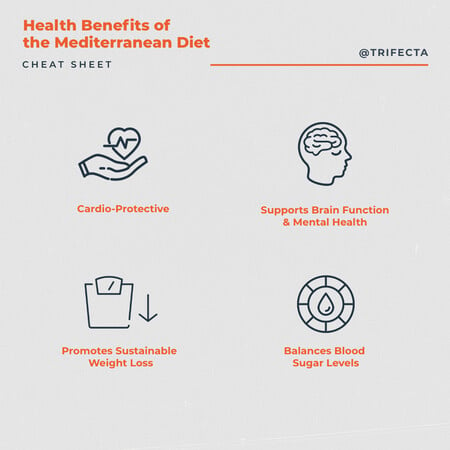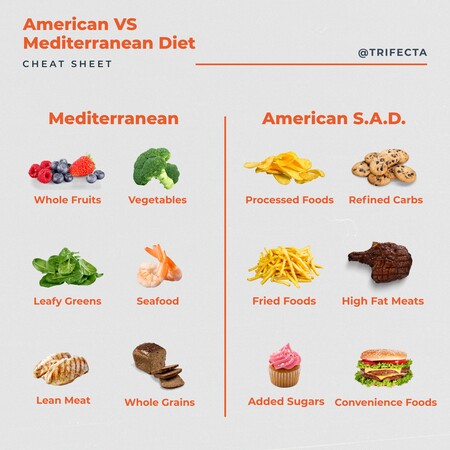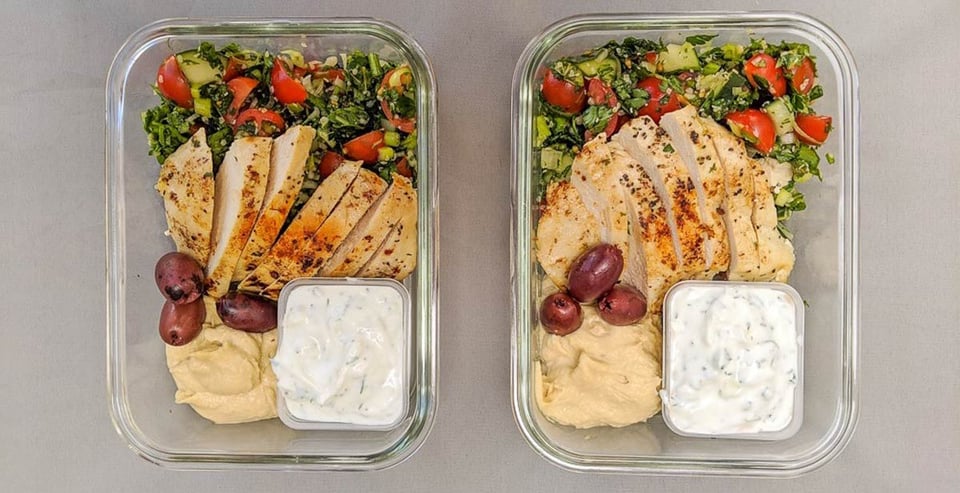You’ve likely heard about the Mediterranean diet, and for good reason, this heart-healthy dietary style is associated with a variety of benefits and may help support energy production, brain function, healthy blood sugar levels, and more.
Here is your go-to guide to understanding and integrating a Mediterranean eating approach into your daily routine, including a grocery list, sample menu, and tips to get started.
What is the Mediterranean Diet?
The Mediterranean diet is a term used to describe a nutritional model based on the cultural, historical, social, environmental, and ultimately the lifestyle of the people who live in the countries bordering the Mediterranean Sea; taking inspiration from Greece, Spain, Italy, and France.
Historically, these countries have had the lowest reports of health disparities including heart disease, diabetes, and even neurodegenerative diseases. Conversely, in the U.S., 6 out of 10 adults struggle with a chronic disease, according to the Centers for Disease Control and Prevention (CDC) (1, 2).
Granted, it’s important to remember that almost all cultural diets have foods that may be correlated with health, so in reality, the health claims around the Mediterranean diet are mostly based on comparing it to a standard American diet, often called a S.A.D. diet.
Research has shown that improved quality of life in the Mediterranean region has been supported by a food model that prioritizes local and seasonal foods, healthy fats, appropriate portion sizes, and an active lifestyle while minimizing the consumption of animal fats, sweets, and processed foods (3).
It’s no surprise that the food we eat impacts our health in big ways. A high-quality diet (in the right amounts) can help us maintain optimal health and act as a preventative measure against metabolic diseases such as obesity, diabetes, and hypertension.
The indoctrination of the Mediterranean Diet in the US is attributed to an American scientist, Ancel Keys. In the 1950s, Keys led one of the first studies examining the relationship between lifestyle, nutrition, and cardiovascular disease among different populations in the Mediterranean regions. It was from this research that Keys was able to scientifically prove the nutritional and health benefits of the Mediterranean diet (3).
We craft personalized meal plans with whole foods, healthy fats, and lean proteins to support your health. Health begins on your plate, and we are serving up the right food for results.
Health Benefits of The Mediterranean Diet

The Mediterranean diet is linked to a long list of potential health benefits as it is one of the first dietary patterns to be studied extensively as a whole, as opposed to traditional diet studies that assess single nutrients or food groups in relation to the development of disease.
Most of the benefits are attributed to the abundance of healthy Mediterranean foods included constantly, such as whole vegetables, healthy fats, oils, and whole grains.
Promotes Heart Health
Research shows that a Mediterranean diet is linked to lower cardiovascular risks and is viewed as a beneficial diet for the primary prevention of cardiovascular disease (4).
Several large studies have also demonstrated that a Mediterranean diet can be effective for reducing waist circumference, blood lipids, and blood pressure, and managing blood glucose levels, all factors that influence our cardiovascular and overall health (5, 6).Supports Healthy Blood Sugar Levels
A high-quality diet such as the Mediterranean diet combined with consistent dietary patterns may positively influence our blood sugar levels and protect us against type 2 diabetes.
Several large studies have shown that adhering to a Mediterranean diet led to improvements in fasting blood sugar levels and levels of hemoglobin A1C, markers used to assess blood sugar control and insulin sensitivity (7, 8).
Protects Against Cognitive Decline
Studies have shown that the Mediterranean diet may reduce risk factors for neurodegenerative diseases such as Alzheimer's and potentially help improve cognitive function and memory (9).
These risk factors are similar to those that influence our risk of heart disease, although the neuroprotective effects of a Mediterranean diet may be influenced by the inclusion of healthy dietary fats, and contrary to what you may have been told in the past, fat doesn’t make you fat.
The Mediterranean diet stresses the consumption of quality fats rich in EPA and DHA omega-3 fatty acids, found in seaweed, egg yolks, and cold-water fish such as salmon, cod, and sardines. These types of fats have been shown to support healthy brain function, specifically DHA which is essential for the growth and functional development of our brains when we are younger (10).
Both DHA and EPA are thought to have powerful anti-inflammatory effects and have been linked to numerous health benefits including weight loss, chronic disease prevention, and neuroprotective effects (11).
Learn all you need to know!
What Foods are Included in a Mediterranean Diet Meal Plan?

There are no specific nutrition goals around the Mediterranean diet approach, unlike when you follow a keto diet, but rather general guidelines to empower you to make the best choices when it comes to your diet.
The Mediterranean diet used in research studies outlines eating a balanced diet as follows:
A rich intake of:
- Whole, phytonutrient-dense fruits, and vegetables
- Whole grains
- Legumes
- Nuts
- Seeds
A moderate intake of:
- Fish
- Seafood
- Poultry
- Dairy
A limited intake of:
Mediterranean Diet Shopping List
Remembering what to stock up on and what to cut out can be difficult. Download the following Mediterranean Diet Shopping List and keep it handy for your next trip to the store.
|
The Beginner’s Guide: Mediterranean Shopping List |
||||
|
Vegetables |
Fruits |
Herbs & Spices |
Dairy |
Legumes/Whole Grains |
|
Tomatoes Kale Spinach Onions Cauliflower Broccoli Fennel Watercress Cabbage Mushrooms Swiss Chard Sweet Potatoes Turnips Cucumbers |
Apples Figs Grapes Peaches Melons Dates Oranges Pears Bananas Pomegranates Raspberries Lemons Limes |
Parsley Oregano Rosemary Lemon Balm Saffron Garlic Basil Mint Nutmeg Cinnamon Pepper
|
Cheeses (feta, pecorino, halloumi, ricotta, labneh, goat’s milk cheeses) Greek yogurt or dairy alternatives Kefir Milk (buttermilk & plain)
|
Chickpeas Barley Oats Brown Rice Farro Amaranth Quinoa Beans Peas Rye Whole wheat bread Whole wheat pasta |
|
Healthy Fats |
Nuts & Seeds |
Fish & Seafood |
Poultry/Meats |
|
|
Avocados & Avocado Oil Extra Virgin Olive Oil Olives (black, green, kalamata) Flaxseed oil Hempseed oil Ghee |
Almonds Walnuts Macadamia Nuts Hazelnuts Cashews Sunflower seeds Pumpkin seeds Chia seeds Cashews |
Omega-3 rich fish: Salmon Cod Atlantic mackerel Sardines
|
Chicken & Eggs Duck Turkey Beef Lamb
|
|
|
Foods To Limit or Avoid |
||||
|
||||
The food list above gives you a general outline of what foods to optimize if you’re looking to integrate a Mediterranean diet approach into your lifestyle.
One of the least discussed qualities of the Mediterranean diet is the focus on local and sustainable foods. Eating locally not only supports your local farmers and ranchers but also may reduce your exposure to pesticides and herbicides used heavily in conventional farming practices.
No matter how you decide to stock your pantry and fridge for your meal prep, here are a few simple guidelines for how to choose quality food products:
- Buy locally grown foods from a farmers market or community-supported agriculture (CSAs)
- Purchase organic when possible
- When you do choose to consume animal products, try to buy 100% grass-fed meats, pasture-raised eggs & poultry, and sustainably sourced seafood.
How to Start a Healthy Mediterranean Diet
A Mediterranean diet approach can help you rethink how you plan your meals by transitioning from meat as the star of the show to more of a side dish while more plant-based options take the main stage.
Here are three great tips for transitioning to a Mediterranean diet.
1. Plan Meals Around Your Nutrition Goals
The better you get at planning a menu that matches your nutritional needs and health goals, the less food you tend to waste, and ultimately the better results you see regardless of following a Mediterranean, flexitarian, vegetarian, vegan, or omnivore-style diet plan.
Once you identify your big-picture health goal, learn how many calories you should be eating each day and how much food that actually translates to.
A Mediterranean diet approach may not have you tracking calories, but understanding the range of calories you need to consume each day can help you track your food intake and manage your health journey.
Try this free calorie calculator to get your total daily energy expenditure (TDEE) in a few minutes:
Get familiar with food portioning tools like measuring cups, spoons, or even a food scale. Then build your meal plan and shopping list around the quantity you actually eat.
Understanding your goals and what motivates you will help you build a sustainable food plan and get results.
2. Rethink Your Plate Portions
A traditional American approach may have you put meat as the centerpiece of your plate, but many Mediterranean dishes prioritize fruits and vegetables first, along with whole grains.
Reduce your intake of animal proteins by increasing the number of fruits and vegetables on your plate along with a small portion of whole grains such as quinoa, brown rice, or whole-grain pasta.
Increasing your vegetable intake can get repetitive. To ensure variety, check out your local farmers market for some seasonal inspiration in your meal prep. You can also bulk up on leafy greens such as kale, spinach, collard greens, swiss chard, arugula, and dandelion greens!
3. Purchase Staple Healthy Mediterranean Foods
If you’re just starting out, choose 2-3 Mediterranean-style recipes and designate them as your go-to staples. This will have you shopping for more Mediterranean ingredients and becoming familiar with the flavors and cooking methods.
This could include a simple Greek salad recipe, Mediterranean bowl, or even grilled chicken skewers.
Sample Menu For A Mediterranean Diet

These recipes are plant-based and nutritional balanced for optimal flavor and meal prep planning ease.
|
One Day Mediterranean Meal Plan |
|
|
Breakfast |
Egg Frittata with Pesto Or |
|
Lunch |
Or |
|
Dinner |
Salmon and Lemon-Parmesan Kale Salad Or |
Get even more advice on what to eat, how to resist cravings, and how to set weight-loss goals you can accomplish. Download your FREE copy of the Ultimate Guide for Weight Loss and Healthy Living today!




